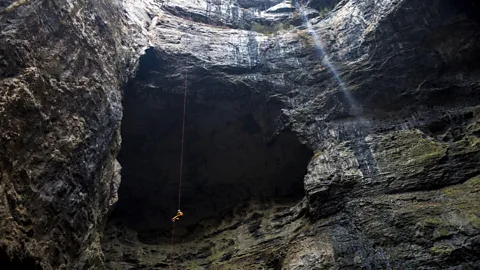Xiaoxhai Tiankeng: the world's biggest sinkhole
 Design Pics Inc/Alamy
Design Pics Inc/AlamyIt was only "discovered" by the outside world in 1994, and experts still aren't sure how it formed.
Peering down from outer space at the rolling green landscape of south-western China's rural Chongqing Municipality, a series of deep, dark gashes appear, denting the land like an alien footprint. Some experts wonder whether these mysterious formations are the result of a meteorite crashing into the Earth. Others believe they gradually formed over some 128,000 years, as water seeping into underground rivers slowly carved the surrounding limestone rock on its journey.
But one thing is for certain: measuring 660m deep, with a volume of 130 million cubic metres, China's Xiaoxhai Tiankeng is both the deepest and largest sinkhole in the world.
Tiankeng means the "The Heavenly Pit", and its sheer sides plummet to a veritable netherworld that's home to a thriving ecosystem of some 1,285 plant and animal species – including the rare gingko and clouded leopard. Aside from its vast size, the formation is also unique in that it's a double-nested sinkhole holding two craters joined by a sloping edge. In the rainy season, a waterfall cascades from the mouth of the pit, feeding an underground river and cave network at its base.
While locals have known about the sinkholes for centuries, it was only "discovered" by the outside world in 1994, when British explorers attempted to survey its maze-like underground cave system. Despite attempting to map the underground river five times in a 10-year period, speleologists found the gushing torrent too difficult to navigate and the team never succeeded. As a result, this deep, dark underworld remains one of China's great geological mysteries.
This video is part of BBC Reel's Ultimate World playlist.
---
Join more than three million BBC Travel fans by liking us on Facebook, or follow us on Twitter and Instagram.
If you liked this story, sign up for the weekly bbc.com features newsletter called "The Essential List". A handpicked selection of stories from BBC Future, Culture, Worklife and Travel, delivered to your inbox every Friday.
